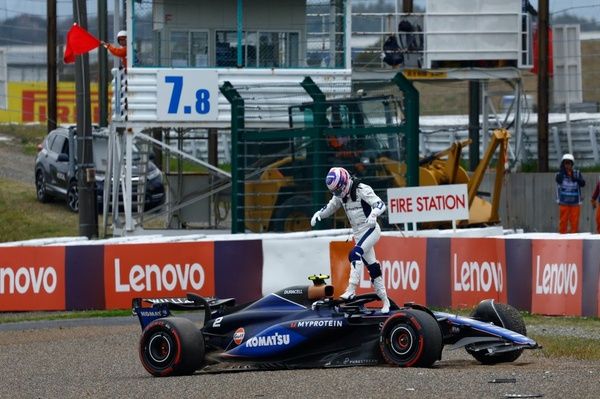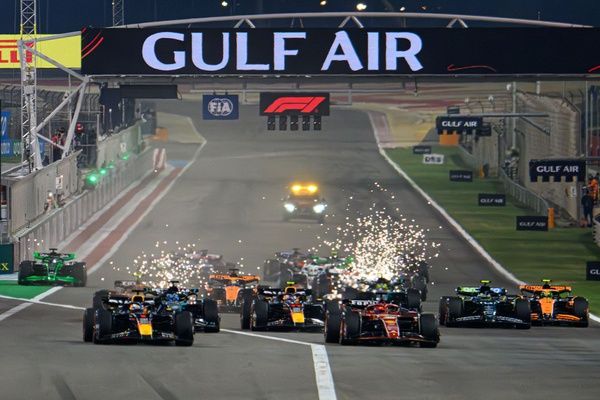ITV has a hard act to follow
Hardly an original sentiment, but I must say that I have great sympathy for the BBC just at the moment, and this comes from the heart, for in normal circumstances I would reckon any outfit which subjects the I nation to Noel Edmunds and Ben Elton deserves everything it gets

As of the end of the 1996 season, coverage of major European-style motor racing, Formula 1 included, passes into the hands of ITV, and I would be telling less than the truth if I claimed not to have any misgivings. For me, at least, the commercial channels have but rarely held a candle to the BBC in matters of sport.
It remains to be seen, however, what ITV will make of motor racing, and much, of course, will depend on the commentary team. Over time, Murray Walker has been the butt of endless jokes - the great majority of them affectionate, I should add - but I have never known a greater enthusiast of the sport, nor one who works more diligently.
You might imagine that, like most commentators, Murray sits behind the microphone; he does not. M. Walker in full flow, I can tell you, is a daunting sight, adopting a sort of knees-bent combat stance, as if preparing for an imminent bayonet charge. In the days of dear old James, the pair of them made for a remarkable contrast, not least in manner of delivery, for you would have Murray, who, as Clive James once memorably said, 'even in his quieter moments sounds as though his trousers are on fire', and the languid Mr Hunt, with his quiet, plummy, voice, and sometimes devastating one-liners. I thought they constituted the best commentary team I have ever heard on any sport.
Some have criticised Murray for his excitable delivery, but for me this is where his particular genius has always lain. Many a time, particularly on a torpid afternoon, I have not always found it easy to fend off drowsiness in the late laps of a Grand Prix, when eight cars are droning around, with not a battle in sight. Then I get home the next day, put the video on - and Murray makes me think I missed the race of the decade.
I never truly appreciated his contribution to our sport until the Canadian Grand Prix of 1988. Then, as now, the Grands Prix were transmitted in North America by ESPN, and occasionally I had watched races from their box, keeping a lap chart and notifying Jackie Stewart, their celebrity commentator, of closing gaps and so on. By this time, JYS had given up the job, and the anchor man in 1988 was Chris Economaki, in those days the doyen of commentators on the American racing scene.
Alongside him usually was David Hobbs, but that weekend David was away finishing fifth at Le Mans in a Porsche 962. On the spur of the moment, therefore, ESPN asked me if I would share the commentary with Economaki; on the spur of the moment, I agreed.
It was nightmarish. For one thing, my voice, next to Chris's strident 'Noo Yark' tones, was next to inaudible; for another, there was the race itself. This was the year, you may remember, of absolute McLaren-Honda domination. Prost led Senna for the first 19 laps, and then Ayrton led Alain to the finish. Gerhard Berger's Ferrari ran third until its engine blew, after which Thierry Boutsen's Williams held the position to the flag. Only three cars were on the lead lap. In an anyway stultifyingly boring season, that particular race was something else again.
Believe me, I swiftly came to appreciate the difficulties of the job; in particular, I realised the value of Murray's 'trousers on fire' routine.
The surroundings didn't help, either, for we were crammed into a tiny hut thing, which allowed only the most fleeting glance of the cars as they headed towards the first turn. In fact, Economaki pointed out, that was a help in one respect, for what you had to remember above all, he said, you had to remember that you were talking about what was on the screen, not what was happening in front of you. The other thing made abundantly clear was that you didn't try to speak while he was holding forth, which - fortunately for me - was most of the time.
My biggest fear, I confess, was that, in the heat of the moment, I would swear, come out with a torrent of impromptu language which would send middle America into spasm. Before the race, I mentioned my concern to J. Hunt, a man with a colourful turn of phrase himself, but he told me not to worry: 'It just doesn't happen,' he grinned. 'F*** knows why...'
He was right, in fact. And, of course, it probably helped that there was no heat of the moment that day, anyway. Cricket commentators, aided by a glass or two of claret, have been known to doze off in the warmth of an afternoon at Lords, I am told. I wasn't far away in Montreal, and the thing was over in an hour and 40 minutes.
Afterwards, we discovered that the McLarens, apparently cruising, were actually low on fuel and that Prost's car had been overheating. Wish we'd known that at the time.
Murray, James and Jonathan Palmer apart, I have come to know a lot of the BBC folk involved in Formula 1 down the years, and have always been impressed by their enthusiasm for the sport. It has not been simply another assignment for most of them, but a way of life, as it is for me and my journalistic colleagues. Steve Rider, for example, has become a genuine Fl fan, and undoubtedly he and others will be feeling shell-shocked just now.
It remains to be seen now what form ITV's coverage will take. The new deal encompasses Formula 3000 and International Touring Car Championship races, as well, so certainly armchair viewers won't lack for motor racing on their screens in years to come. Eurosport will also continue with F1 and Indycar coverage, and inevitably one wonders if, for 1997, ITV will make an approach to the excellent Ben Edwards, who works so harmoniously with an ever sharper John Watson.
In the end, I suppose, it comes to the bottom line, which is the way of it in the '90s. Hamstrung by the limitations of the licence fee, the BBC is hard-pressed to compete financially with ITV, which itself comes under increasing pressure from Mr Murdoch and his satellite gang. I understand completely the Beeb's indignation at not being invited even to tender for the new contract, but that is the way of it these days, as the Adelaide organisers, for example, can tell you. Overwhelming offers tend to be accepted.
The format of a Grand Prix weekend changes next year, with only a single qualifying session, on Saturday afternoon. This will undoubtedly focus more attention on the settling of the grid, and perhaps the BBC - with some wretched horse race meeting usually going out at that time -would have been hard-pressed to set aside an hour for it. As well as that, it has to be said that F3000 and ITC sponsors will rejoice at terrestrial coverage of their series.
I'll say it again, though: the BBC - complete with Murray - will be a very hard act to follow. Already, Eurosport's commercial breaks drive me nuts...
Be part of the Autosport community
Join the conversationShare Or Save This Story
Subscribe and access Autosport.com with your ad-blocker.
From Formula 1 to MotoGP we report straight from the paddock because we love our sport, just like you. In order to keep delivering our expert journalism, our website uses advertising. Still, we want to give you the opportunity to enjoy an ad-free and tracker-free website and to continue using your adblocker.











Top Comments